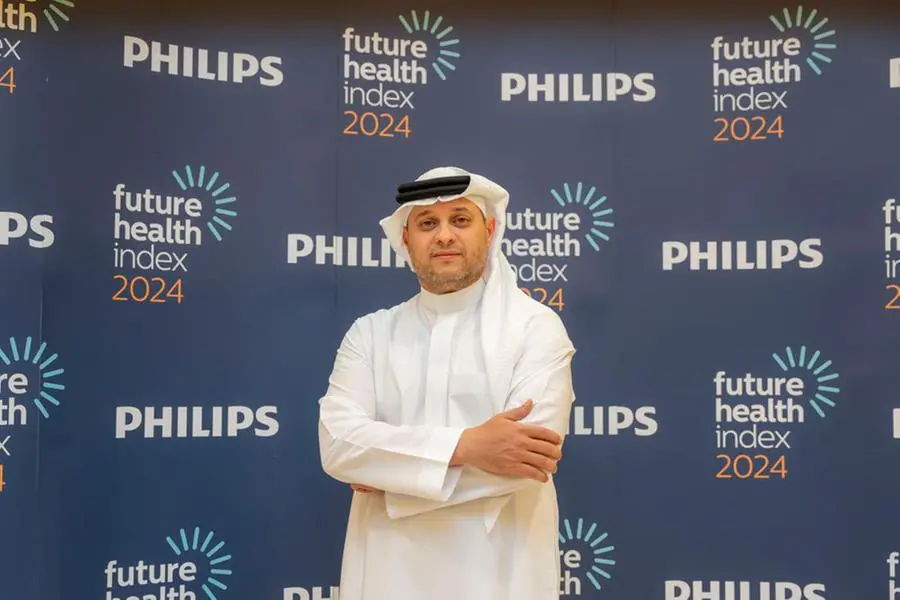PHOTO
- Saudi Arabia is leading the way with AI implementation in healthcare; AI has already been adopted in several clinical areas, with 100% of healthcare leaders saying their organizations are currently investing in or planning to invest in generative AI technologies within the next three years.
- Saudi Arabian healthcare leaders recognize the positive impact of virtual care on easing staffing pressures and patient care.
- Saudi Arabian healthcare leaders are focused on making a positive environmental impact, adopting virtual care technologies and remote monitoring to reduce emissions.
Riyadh, Saudi Arabia: Royal Philips (NYSE: PHG, AEX: PHIA) a global leader in health technology, today released the findings of the Future Health Index (FHI) 2024 Saudi Arabia report. The ninth edition of the report, which surveyed nearly 3,000 healthcare leaders in 14 countries, shows that Saudi Arabian healthcare leaders are at the forefront in the adoption of AI-enabled innovation to improve patient care.
The FHI 2024 for Saudi Arabia indicates that the local healthcare sector is marked by its pioneering adoption of AI, the positive impact of virtual care and automation on the workforce, and its collective commitment to environmental sustainability.
“This year’s Future Health Index investigates the significant progress and promising opportunities in ensuring timely, high-quality care for all,” says Akram Sirafy, General Manager, Philips Saudi Arabia. “The report highlights the strides taken in the ongoing transformation of the healthcare sector, which is crucial for the well-being of our population and for positioning Saudi Arabia as a regional leader in healthcare and innovation.”
Virtual Care and Automation are empowering a stretched workforce and enhancing patient care
Most Saudi Arabian healthcare leaders (92%) believe that the use of technology to automate repetitive tasks or processes is critical for addressing staff shortages in healthcare.
Significant progress has already been made in the space of automation, including digitizing health records, automating administrative tasks, and clinical workflow management systems, to increase productivity and satisfaction among healthcare staff.
All the Saudi Arabian healthcare leaders (100%) recognize the positive impact of virtual care on easing staffing pressures and 90% say patients at their organization are positive about virtual care.
Saudi Arabian healthcare leaders have reported significant benefits of virtual care integration, including enhanced staff support for complex patient management (37%); improved patient appointment attendance (34%); creating new career options for healthcare professionals who want remote working (34%); and adding capacity to serve patients (33%).
Healthcare leaders are turning to actionable insights and AI
While automation and virtual care demonstrate great potential, 100% of Saudi Arabian healthcare leaders acknowledge that data integration challenges impact care delivery.
Saudi Arabian healthcare leaders believe data-driven insights could help reduce diagnostic and elective procedure waiting times and optimize treatment plans or pathways. They also view them as vital for patient demand forecasting, predicting adverse events, identifying evidence-based best practices, detecting medical conditions, and reducing hospital readmissions – all essential for improving patient care.
“To realize these possibilities, healthcare leaders are looking to partnerships to overcome system limitations,” says Sirafy. “Improving care coordination and enhancing technology integration and interoperability are among the top drivers for collaboration, to realise a more structured and innovative form of healthcare.”
Saudi Arabian healthcare leaders also recognize the benefits that generative AI could bring to healthcare by unlocking new efficiencies and insights from patient data. Their interest means that healthcare leaders in the Kingdom are currently investing in generative AI (41%) at a higher rate than the global average (29%).
Where once AI was used more in operational settings, today AI has already been adopted in several clinical areas such as treatment planning and in-hospital patient monitoring, (both 72%), with plans to implement AI in medication management (48%) and remote patient monitoring (37%) ranking high for the next three years.
Looking 12 months ahead, more leaders in Saudi Arabia are planning to invest in generative AI (49%) – highlighting Saudi’s Vision 2030 to become a global technology leader that empowers its people to thrive, in action.
Demonstrating a world-class commitment to environmental sustainability
Saudi Arabian healthcare leaders acknowledge that addressing the sector's impact on the planet is no longer a matter of if – it is a matter of how – with healthcare leaders in Saudi Arabia focused on making a positive environmental impact.
Over half of the organizations (54%) are recycling waste wherever possible, according to Saudi Arabian healthcare leaders, and 53% are implementing sustainable procurement including circular equipment.
In planning for the future, Saudi Arabian healthcare leaders are guiding the way with environmental strategies. Nearly half say within the next three years their organizations are likely to reduce energy use (49%), with a similar number planning to invest in green buildings and infrastructure (48%), selecting suppliers with sustainable targets/initiatives (47%), and using virtual care technologies/remote monitoring to reduce emissions (45%).
“At Philips, we are committed to partnering with healthcare providers on their sustainable healthcare journey,” says Sirafy. “We envision a future where everyone, regardless of who they are or where they live, can access the care they need, when they need it. This is a future built on the strength of partnerships that bring stakeholders together across the healthcare ecosystem to collaborate and develop scalable solutions. That is how we can ultimately deliver better care to more people.”
To access the report, visit https://www.philips.sa/en/a-w/about/news/future-health-index/reports/2024/better-care-for-more-people.html
About the Future Health Index
The Future Health Index 2024 report explores how healthcare leaders view their hospital’s ability to deliver timely, high-quality care to everyone. A quantitative survey was conducted among almost 3,000 healthcare leaders from 14 countries (Australia, Brazil, China, India, Indonesia, Italy, Japan, the Netherlands, Poland, Saudi Arabia, Singapore, South Africa, the United Kingdom, and the United States). This report highlights critical trends, challenges, and opportunities in the healthcare sector.
About Philips
Royal Philips (NYSE: PHG, AEX: PHIA) is a leading health technology company focused on improving people's health and well-being through meaningful innovation. Philips’ patient- and people-centric innovation leverages advanced technology and deep clinical and consumer insights to deliver personal health solutions for consumers and professional health solutions for healthcare providers and their patients in the hospital and the home. Headquartered in the Netherlands, the company is a leader in diagnostic imaging, ultrasound, image-guided therapy, monitoring, and enterprise informatics, as well as in personal health. Philips generated 2023 sales of EUR 18.2 billion and employs approximately 69,300 employees with sales and services in more than 100 countries. News about Philips can be found at www.philips.com/newscenter.




















